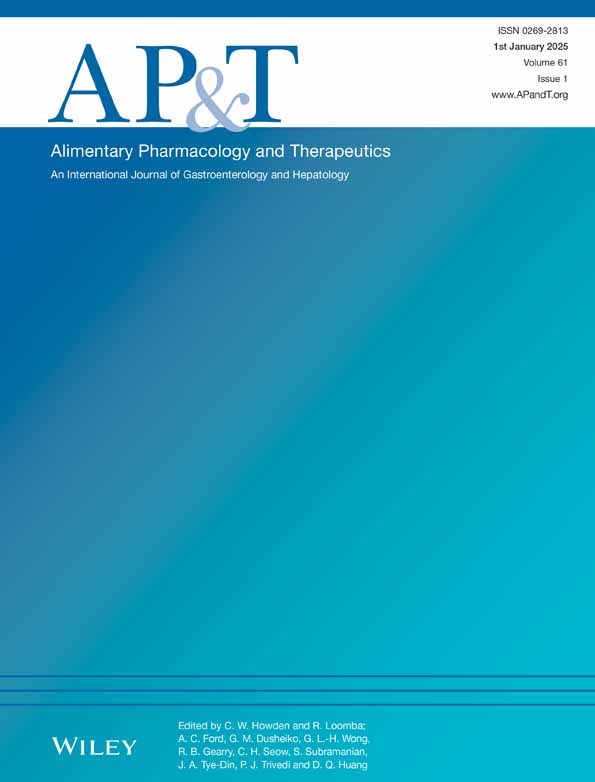Letter: Analysis of “Faecal Biomarkers for Diagnosis and Prediction of Disease Course in Treatment-Naïve Patients With IBD”—Authors' Reply
Funding: This work was funded by Swedish Foundation for Strategic Research (RB13-016); Swedish Research Council (2020-02021); Örebro University Hospital Research Foundation (OLL-890291), and Medical Faculty, Uppsala University, Uppsala Sweden.
We read with interest the letter by Chen et al. [1] regarding our article on faecal biomarkers for the diagnosis and prediction of disease course in treatment-naïve patients with inflammatory bowel disease (IBD) [2]. We thank the authors for their valuable comments. We agree that the low specificity of faecal calprotectin (FC) for predicting IBD motivates further exploration of other potential biomarkers, which is why we combined FC with other faecal biomarkers and examined the performance of these combinations compared to FC alone. In fact, we observed an improved diagnostic capacity when combining FC and myeloperoxidase (MPO) and proposed a model that potentially may enhance the specificity of neutrophil-based biomarkers [2].
We followed the cohort of patients newly diagnosed with IBD over time, and their clinical disease course was determined 12 months after diagnosis. We agree with Chen et al. that the predictive value of the reported biomarker might have been strengthened by extending the follow-up period. The poor predictive accuracy of the biomarkers in patients with Crohn's disease (CD) in our cohort may also been influenced by the relatively short follow-up period. However, as we highlighted, recent data indicate that most complications of CD occur within the first 6 months following diagnosis [3]. Additionally, we have previously shown that the capacity of FC to predict future flares decreases after 3 months [4].
Chen et al. remarked that lactoferrin and S100A12 were not included in our work. While we acknowledge these could have been considered, a complete survey of all potential neutrophil biomarkers was beyond the scope of our study. Notably, prior studies have shown that S100A12 has not outperformed FC in IBD diagnosis [5].
Commonly used medications, such as NSAIDs and PPIs, can influence FC levels [6], and the absence of this information in our study is a significant limitation. The impact of these medications on the other biomarkers we analysed remains to be determined. Nevertheless, we cannot rule out the possibility that the use of NSAIDs or PPIs may have influenced our results. Chen et al. also raised concerns about the costs of analysing faecal markers. While these costs are much lower than those of colonoscopy, we welcome further health-economic assessments of monitoring algorithms in IBD that include faecal markers.
Finally, Chen et al. questioned our decision to analyse treatment-naïve patients and called for research on how prior treatment affects faecal biomarkers, arguing that most patients would already have received various treatments. As we previously demonstrated, these faecal markers are affected by IBD medications including biologics and corticosteroids [7]. With the increasing availability of treatment options, identifying predictive biomarkers for specific therapies is important in the era of personalised medicine. However, the accuracy of diagnostic and prognostic markers should be explored in newly diagnosed patients, preferably before initiation of treatment. Therefore, we respectfully disagree with the criticism of our study design but welcome further methodologically sound research to identify markers that can guide clinical decision-making in IBD.
The authors' declarations of personal and financial interests are unchanged from those in the original article [2].
Author Contributions
Maria Ling Lundström: writing – original draft, writing – review and editing. Maria Lampinen: writing – review and editing. Marie Carlson: writing – review and editing. Jonas Halfvarson: writing – review and editing.
Conflicts of Interest
Jonas Halfvarson served as speaker and/or advisory board member for AbbVie, Aqilion, BMS, Celgene, Celltrion, Dr Falk Pharma and the Falk Foundation, Eli Lilly, Ferring, Galapagos, Gilead, Hospira, Index Pharma, Janssen, MEDA, Medivir, Medtronic, MSD, Novartis, Pfizer, Prometheus Laboratories Inc., Sandoz, Shire, Takeda, Thermo Fisher Scientific, Tillotts Pharma, Vifor Pharma, UCB and received grant support from Janssen, MSD and Takeda. Marie Carlson has received speaker's fees from Vifor Pharma. She is the national PI for clinical trials for AstraZeneca. None of these activities has any relation to the present study.
Linked Content
This article is linked to Ling Lundström et al papers. To view these articles, visit https://doi.org/10.1111/apt.18154 and https://doi.org/10.1111/apt.18312.
Open Research
Data Availability Statement
Data sharing is not applicable to this article, as no new data were created or analyzed in this study.




